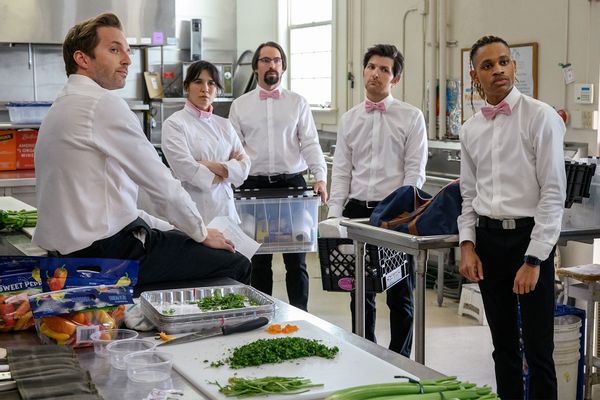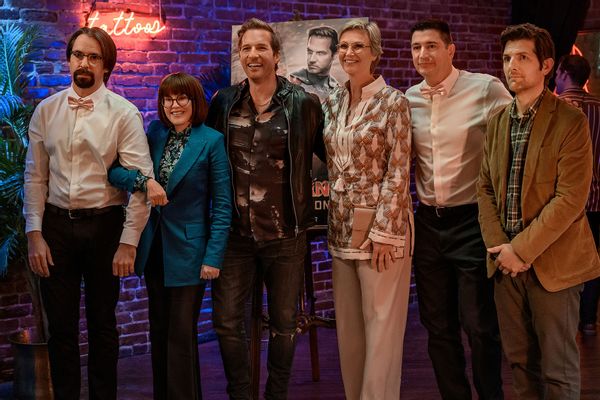
When Episode 1 starts, we don't know what time it is. It could be any year. We're in a restaurant/bar which could be any restaurant/bar. It's dark inside and out. It could be any time of night. And the costumes of the characters, mainly pressed white shirts with pink satin bow ties and black pants, are timeless.
It's "Party Down" and it's back on Starz for a third season, more than a decade after the last one wrapped. The Ringer describes the new season as "an unlikely return to air." The original run of the show was canceled in 2010, mere days after only 74,000 viewers watched the finale of Season 2.
A lot has happened in 13 years. A seismic election, an attempted coup and a devasting pandemic that has killed millions of people and continues to be deadly. It's this last area where the new "Party Down" surprisingly shines. It doesn't flinch away. It doesn't make the pandemic the whole story, but it acknowledges the threat always running in the background like a faulty refrigerator. It turns out, what the changed and difficult world needs now are cater waiters who understand, perhaps more than anyone, the unstable life we've been dealt.
"Party Down" centers on a group of aspiring performers and creatives in Los Angeles who pay the bills by working as cater waiters for fancy events. Ron Donald (Ken Marino) is the long-suffering, hapless boss of the outfit with employees like Henry Pollard (Adam Scott), who reached viral and fleeting fame long ago uttering the line, "Are we having fun yet?" in a blockbuster beer commercial. As Den of Greek pointed out, we have yet to see that ad, but I always pictured something along the lines of Seth Green's 1992 Rally's Hamburgers commercial.
In the return of "Party Down," Henry works as a high school English teacher but goes back to the catering fold when he needs money. My personal favorite Martin Starr as the bitter, brilliant Roman is still there, moonlighting while trying to write science fiction. Ryan Hansen's Kyle is an actor, sort of. Jane Lynch's Constance and Megan Mullally's Lydia have left the unit, existing as a rich widow and the manager of a child star, respectively. Only former waiter Casey (Lizzy Caplan) has made it in show biz — and in the "Party Down" world, making it means you aren't around.
The party of the world was canceled, and the party cater waiters were out of luck.
As makes sense for a show that's been gone for so long, there are meta elements of the story as it attempts to catch us back up. "OK, to review," are the first words out of Ron's mouth. But in many regards, the service industry is changeless. The uniforms are the same. The attitudes of the privileged guests and their disdain for their servers, the same. The appetizers are the same fancy shrimp (this is a source of frustration for new addition Zoë Chao as chef Lucy). But one thing that has altered the food service industry? It was among the hardest hit by the pandemic.
In the first three months of COVID, the industry lost 5.9 million jobs. People stopped going out to eat. Service workers were laid off, became ill, died. Restaurants closed. The party of the world was canceled, and the party cater waiters were out of luck. "It's still not normal," The Washington Post wrote in a late 2022 article headlined "How the pandemic altered the restaurant industry forever." Current issues include a labor shortage. It makes sense that Henry (and Kyle, after his break and his luck run out) would return to work with the catering group.

Figuring out how to address or not address the pandemic is one of the central problems in current fiction. At its worst, it requires storytellers to be fortunetellers as well.
But this isn't just a gag to begin the relaunched show. Subsequent episodes, set later in time, address the pandemic in subtle and not-small ways, from some though not all party-goers wearing masks to the title of the second episode, "Jack Botty's Delayed Post-Pandemic Surprise Party." There's sadness here, but all the characters have survived, so far, though survival has taken a toll. They're weary but resilient. The party scheduled in the first episode does happen, though not as or when planned.
Figuring out how to address or not address the pandemic is one of the central problems in current fiction. At its worst, it requires storytellers to be fortunetellers as well. How far in the future is this? My editor asked about my next novel, which mentions the pandemic but does not set its plot in the midst. "Are authors expected to somehow know when it ends?" I thought. A trick question, because it turns out it doesn't. How shows, books, stories and other art tackle the virus will be one of the questions studied in the future, if we have a future.
Some recent shows like "Ted Lasso," "Only Murders in the Building" and "The Chair" ignore it completely. Some, like "Grey's Anatomy" and "The Morning Show" make it a huge part of the plot. This was hard to swallow, particularly at the beginning of the virus. Some take the terrible idea, as "You" did, of writing about an entirely different illness — in the case of "You," the measles — and making it all feel like one big metaphor.
When the first novels specifically incorporating COVID arrived, I was both shocked at the speediness — traditional publishing moves slow — and nauseated. We often read and watch fictions specifically to escape the world, not to be trapped inside its currently unfolding nightmares. "Does the world need COVID novels?" The Harvard Gazette asked in 2022.
It hasn't worked out for the cater waiters, but that doesn't mean it won't one day, the eternal hope of both show business and the world since 2020.
The best books take existing anxieties and spin them into something different and hopefully gold, like the forthcoming "The Rachel Incident" by Caroline O'Donoghue (author of "Promising Young Woman") which was written, as the writer says, "in the grip of late-stage pandemic blues, and I had just one goal in mind when I began: to make myself smile again. I wanted a book that would make me feel buoyant, hopeful and forgiving during a time where it was easy to feel bleak and enraged." The book is about an intense friendship and an ill-fated love, and not the intense illness during which it was created.

Within this sadness, there is also possibility. When Season 3 starts, on the brink of COVID, the old ways are about to be burned forever. So too the characters are the edge of a new story. The best part of "Party Down," was always that unflagging hope. It hasn't worked out for the cater waiters, but that doesn't mean it won't one day, the eternal hope of both show business and the world since 2020. There's still time to turn it around. As the "Cabaret" song goes, "Maybe this time I'll win."
Perhaps the best way to address the pandemic in art is to acknowledge that things haven't turned out the way we planned. We're not the people we once were or hoped to be, and the world isn't great, safe or the same. It probably never will be again. And also? We have to keep going. We have to keep living in it as long as we can.
In that sense, there are no better stewards through this shifting, disappointing landscape than the cater waiters who are writers, actors, dancers (or "content creators"), musicians and artists. We are all more than one thing. We are often not allowed to be most of them, especially not the identity we want most to inhabit. But we keep on showing up in clean shirts for work.
"Party Down" airs new episodes Fridays on Starz.







